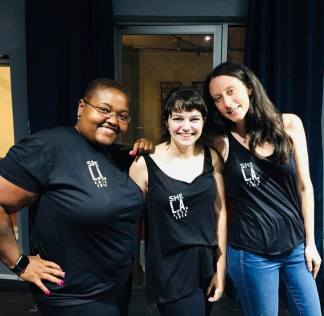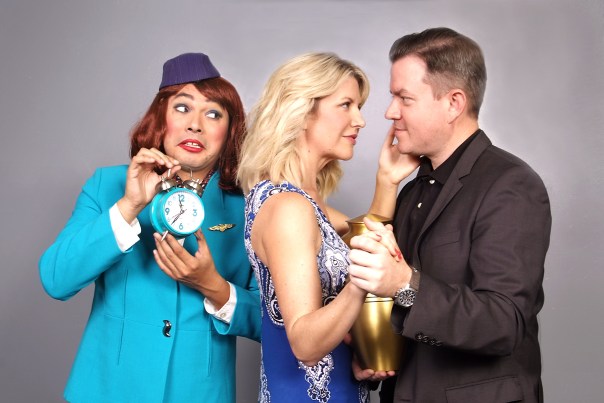 It’s no surprise to any of us in who work the LA Theater scene that the City of Angels is full of major talent – artists who work on and create for the stage, NOT just film and TV. But it’s always satisfying when artists from New York agree with us! Last year, the ladies behind She NYC Arts came to the West Coast to stage their first Summer Theater Festival here under the banner of She LA Arts.
It’s no surprise to any of us in who work the LA Theater scene that the City of Angels is full of major talent – artists who work on and create for the stage, NOT just film and TV. But it’s always satisfying when artists from New York agree with us! Last year, the ladies behind She NYC Arts came to the West Coast to stage their first Summer Theater Festival here under the banner of She LA Arts.
It went so well that they’re back! The 2019 She LA Summer Theater Festival features productions (not just readings!) of full-length plays by Nakisa Aschtiani, Karen Lukesh, Allie Wittner, Ali MacLean and Tiffani Dean, July 30-Aug 4 at the Zephyr Theatre. So we figured it was about time to have a little chat with the organization’s Artistic Director, Danielle DeMatteo.
LAFPI: Can you talk a bit about how She NYC Arts began? And are the Theater Festivals in NYC and now in LA your main focus?

Danielle: She NYC was founded back in 2015 after I had some experiences in the industry as a young, female composer/ rehearsal pianist that were, to say the least, difficult. When I spoke to other early- to mid-career women writers, composers, musicians, and music directors, I found that we all had really similar experiences. It was great to know I wasn’t alone, but was also infuriating. And that made us want to actually do something to fix it.
We found that as a writer starting out in NYC, you had two options to get your work up in full for an audience: self-produce and potentially empty your savings account doing it, or sell your work to a producer who you may or may not trust (and who were usually rich older men). My colleagues and I wanted to find a way to bridge this gap by giving women a way to self-produce and retain control and agency over their own work, without having to take the huge financial risk. So we built on the idea of a festival, where the writers can share the costs associated with producing, giving everyone subsidized and free resources to get their work fully produced. We do some smaller events throughout the year (short play staged readings, concerts of songs by women composers, etc.), but the Festivals in NYC and LA are our main projects.
LAFPI: And just what was it that brought She NYC Arts out to LA?
Danielle: Our second year in NYC, 3 of our 8 shows flew from California to participate. That made it pretty clear to us that there was a need for a program like this on the West Coast, too, and that there were a ton of talented writers in the Los Angeles area who we could invest in. Our first year in LA, 2 of those 3 writers actually became a core part of our producing team to get She LA up and running.
LAFPI: Was there a learning curve setting up camp on the West Coast?

Danielle: In NYC, almost everyone in the theater community has worked on [this kind of] festival at some point (often more than once). So everyone – from writers, to directors, to the actors – fully understands how to put up a show when you have very limited tech and load-in time. In LA, we found that the shows’ teams were not always used to that – and rightfully so, because it’s totally crazy! Because of that, we’ve created more wiggle room in our schedule in LA.
LAFPI: Most new play festivals in LA feature readings or workshops. But you wanted to do more?
Danielle: At She NYC and She LA, our mission is founded on supporting the writers, who are often the first to start work and the last to get paid. When we started in NYC, we had the same situation: There were lots of programs focused on providing staged readings, workshops, or concerts, but no programs that let specifically women writers see their work put up in full. As a writer myself, I know that’s a vital part of the writing process – to see how your scenes work next to each other when you have to do a set change in the middle, or to see how your music works when choreography is added to it.

We want to provide a platform for writers to be able to take that step in full productions – which we define simply as the cast being off-book – but we encourage our writers to do whatever level of production quality they feel will best help them where they’re at in their writing process. If that means you want to do your show black-box style with just a few chairs and blocks, great! If you feel you really need to see your show done in full period costumes with a 5-piece band, we support that, too.
LAFPI: Each year, you have an open submission call for scripts. What has been your experience with the plays and artists who have participated in the She LA Festivals?
Danielle: We are so floored by the level of talent in LA. I won’t name names, but my two favorite shows that we’ve ever done on either coast were She LA shows. I think what’s also refreshing about LA is that our artists out here tend to have a lot of fun with their experience. In New York (again, because folks are really used to the festival lifestyle out there), it can sometimes feel like it’s all business. Which is very important! But in LA, our participants are more likely to have lots of fun WHILE doing their business. They’re also great at self-promotion and social media on the West Coast.
LAFPI: What kind of experience and support can female playwrights who participate in a She LA Festival look forward to?
Danielle: Basically, [for a participation fee] She LA provides all of the technical/logistical things, so the writers can focus on the creative parts of bringing their show to life. The writers provide, and have full control over, their cast, creative team, set design, and costume design. She LA provides the theater space, all of the equipment that goes inside of it (from big things like lights and curtains, to small thinks like spike tape), insurance, and the staff to run their shows.
We provide an amazing Production Manager who runs all tech and performances, as well as her Associate; a Lighting Designer who programs the lights for every show (at the direction of the show’s creative team); front-of-house staff to manage all things that happen in the lobby, including ticketing and printing programs; and a marketing team that helps each creative team promote their own show, as well as making a video ad for each show which we pay to run on social media and other digital outlets. My favorite part of the program, too, is that we provide a Show Mentor to each production. This person is a She LA staff member who is there to guide the writers and their teams through the process, offer advice, help out whenever an extra pair of hands is needed, and make sure they’re prepared and ready to go for their tech and performances.
LAFPI: She LA (and She NYC!) Festivals seem look like they’re very much a team effort. How do you manage to keep a cohesive team together working on either end of the country?

Danielle: “Team effort” is almost an understatement! Pretty much everyone on our team works another day job in the entertainment industry, and we handle She NYC and She LA on the side. On the one hand, that means we’re all crazy busy, with an all-hands-on-deck mentality as we get close to Festival time. On the other hand, it means we all have active contacts in the upper echelons of the entertainment industry, so we can involve some great industry contacts in our program to get our writers’ work in front of them.
For Emily Rellis (the She LA Executive Producer) and I, it’s been a fun ride to build a team in LA. It can be challenging that Emily and I are not on the ground in LA, but they’ve been awesome with being available on the phone, and even FaceTiming us in to a walkthrough of the theater.
LAFPI: Now that the 2nd She LA Summer Theater Festival is around the corner, what are you most looking forward to?
Danielle: This year, I’m very excited that we have one show coming in from Philadelphia (Between the Colored Lines and Other Black Girl Tales, by playwright and poet Tiffani Dean). They actually were a part of the 2018 She NYC Festival, and now are flying out to LA for their West Coast premiere! That’s our first time doing a show on both coasts, and we can’t wait to see how it goes.
That being said, we’re so excited to see all of the shows! We’ve been reading the scripts on paper and talking to the writers via email for so long (we first read their scripts last November!), so finally getting to see them up on their feet is thrilling.
LAFPI: Anything else you want to talk about or share?
Danielle: Thanks to LAFPI for all that you do and all your support! We hope to see you all at The Zephyr Theater. And if anyone wants to get involved with She LA, we’d love to hear from you! Reach us at [email protected], and there’s more information about all of our programs at www.SheLAArts.org.
For Tickets and Info about the 2019 She LA Summer Theater Festival, presenting 5 new full-length plays by women writers and composers July 30-August 4, visit www.SheLAArts.org/she-la.




 December, 2018
December, 2018


















